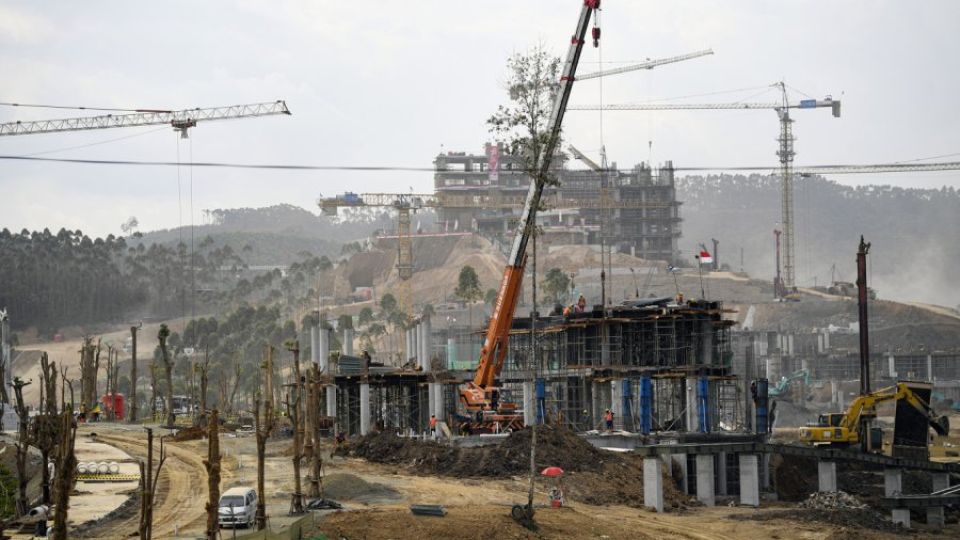JAKARTA (ANN/THE JAKARTA POST) – Indonesian President Joko “Jokowi” Widodo acknowledged on Tuesday that the country’s ambitious megaproject to establish a new capital city, Nusantara, has yet to secure any foreign investments.
Analysts suggest that the lack of international funding is rooted in the project’s perceived commercial unattractiveness, a concern seemingly unaffected by external macroeconomic conditions.
Speaking to the press at the Halim Perdanakusuma air force base in Jakarta, Jokowi emphasised that despite the absence of foreign capital, Nusantara has garnered significant interest from potential investors during investment roadshows and state visits.
“In all countries, we present the progress of [Nusantara] and what investments are available, and many are interested,” Jokowi was quoted by an Indonesian national news agency as saying on Monday at an event to dispatch humanitarian aid to Palestine.
He went on to say that more than 300 Letters of Intent (LoIs) had been inked on the project but no “real” foreign investment had materialised yet. Given the many LoIs, however, it was unlikely that not one of them should result in investment.
“I think there will be a lot [of investments from abroad], it’s just that we are prioritising domestic investors,” said Jokowi.
Nusantara Capital City (IKN) Authority financing and investment undersecretary Agung Wicaksono said it was not mandatory for foreign investors to partner with local ones to get involved in Nusantara’s development, but it was “preferable” when they did so in this early stage.
It is true that the majority of Nusantara’s investors are Indonesians, Agung said in a press briefing on Monday, but it was untrue to view the project as unattractive to outside investors.
“Domestic investors are more satset [fast-moving],” Agung explained in a press briefing on Monday, and given that Nusantara was Indonesia’s future capital city, it “makes sense” for Indonesian investors to be leading the way.
He added that it was not entirely true to say no foreign investment had entered Nusantara, as at least six international firms had partnership roles in several projects for which ground-breaking ceremonies had been staged in early November.
Marriott International has sided with PT Pakuwon Jati in developing hotels set to have hundreds of rooms, and Indian healthcare group Apollo Hospital has entered a partnership with Mayapada to build a hospital.
Agung revealed that 172 of the 305 LoIs had been signed by domestic entities with the remaining 133 by foreign entities. Singapore was in pole position with 27 LoIs signed, followed by Japan with 25 and Malaysia and China with 19 each.

An LoI, according to Monday’s IKN Authority presentation, is only the first of seven steps to take before the conclusion of an investment agreement, the seventh step being a feasibility study.
The authority has been vague in the past when asked how many of the LoIs had advanced to that stage, and given the scant public information, as well as the fact that the companies are required to sign nondisclosure agreements before requesting data for feasibility studies, it is impossible to know how many of the potential investors have backed out since expressing their interest.
The source has requested such information from IKN Authority spokesperson Troy Pantouw to no avail.
Twenty-one LoIs had evolved into investment agreements, Agung unveiled in the briefing, without detailing whether they were part or outside of the 305 announced.
Institute for Development of Economics and Finance (Indef) executive director Tauhid Ahmad opined that Nusantara was commercially unattractive for foreign investors because it remained uncertain how big the market would turn out to be.
“In my opinion, [foreign investors] will wait until the market is formed,” Tauhid told the source on Monday, adding, “When it’s not yet clear, they will not dare”.
Moreover, he mentioned that political commitment also played a role in attracting investment into the new capital, making next year’s presidential election an important factor.
Despite the current administration having enshrined Nusantara in law, it remains to be seen to what extent the next president will back a project so closely associated with his predecessor, President Jokowi.
Tauhid said depending on who out of the three candidates was elected, state budget support for Nusantara would vary, and that may result in the private sector struggling to reach a return on investment.
Speaking to the source on Monday, executive director Bhima Yudhistira Adhinegara of the Centre of Economic and Law Studies (CELIOS) said investing in the new capital was unattractive for now, and that the economic climate was “still unconducive for such a high-risk investment”.
However, he said the global macroeconomic situation was just one of many factors and the external conditions did not fundamentally change Nusantara’s attractiveness for investment.
“Foreign investors still have doubts about the details of the capital city development plan, including the population projection,” said Bhima.



